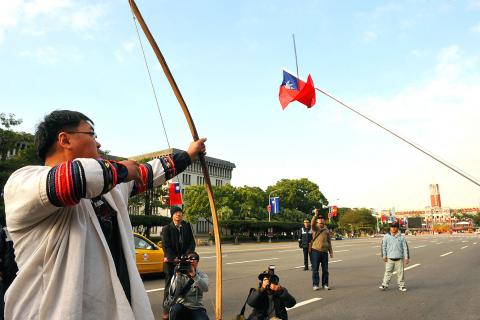While the government was staging a series of events to celebrate the Republic of China’s (ROC) centennial, dozens of Aborigines staged a demonstration in front of the Presidential Office early yesterday morning in which they accused the ROC government of repression and exploitation of the nation’s Aborigines.
Early in the morning yesterday, dozens of Aborigines — mostly Atayals from New Taipei City (新北市), Taoyuan, Hsinchu, Miaoli and Yilan Counties as well as from Greater Taichung — gathered at Liberty Square in Taipei not long after a New Year’s flag-raising ceremony in front of the Presidential Office ended and the crowd was walking away from Ketagalan Boulevard.
At 8am, they walked onto Ketagalan Boulevard and staged a “sun-shooting” skit there.

Photo: Chien Jung-fong, Taipei Times
Tribal elders handed traditional Atayal bows and arrows — all made of bamboo — to younger members of the tribe, and one after another, they shot the “sun” on the ROC flag.
“We Atayals are here to condemn the invasion and exploitation of traditional Aboriginal domains,” one of the demonstrators, Sangas Yumin, told reporters at the scene. “From the Japanese colonial government to the ROC colonial government, we Aborigines have lost not only lands, but also dignity.”
“As the ROC celebrates its 100th anniversary, we are here to recount our sufferings over the past 100 years,” he added.
Sangas said that, in the past century, Aborigines were forced to leave their native lands and traditional hunting grounds and give up their rights to use and manage natural resources in their traditional domains, and their traditional ways of life were destroyed.
Former deputy minister of the Council of Indigenous Peoples Atung Yupas, a tribal leader, said that the “sun-shooting” skit comes from an ancient Atayal story.
Legend has it that, once upon a time, there were two suns in the sky, which caused much suffering for the Atayals, and the people were finally saved when ancient Atayal warriors shot down one of the suns, Atung said.
“The ROC government is the evil sun of modern times for Aborigines and we must fight against it — we must fight against it until the day we walk onto the Bridge of Rainbows,” he said.
The Atayals believe that a Bridge of Rainbows connects their world to the world of their -ancestral spirits, and only those who live as a warrior can walk along the Bridge of Rainbows after death to the world of their ancestral spirits.
Indigenous Peoples Action Coalition of Taiwan secretary-general Omi Wilang, agreed, and said that if the Aborigines do not protest, the land will protest.
“Massive mudslides devastating the country is the protest by the land,” he said.
At the end of the demonstration, those who shot the sun handed the bows and arrows to young children, symbolizing that the task would be passed down to the next generation if it could not be completed by this generation.

An essay competition jointly organized by a local writing society and a publisher affiliated with the Chinese Communist Party (CCP) might have contravened the Act Governing Relations Between the People of the Taiwan Area and the Mainland Area (臺灣地區與大陸地區人民關係條例), the Mainland Affairs Council (MAC) said on Thursday. “In this case, the partner organization is clearly an agency under the CCP’s Fujian Provincial Committee,” MAC Deputy Minister and spokesperson Liang Wen-chieh (梁文傑) said at a news briefing in Taipei. “It also involves bringing Taiwanese students to China with all-expenses-paid arrangements to attend award ceremonies and camps,” Liang said. Those two “characteristics” are typically sufficient

A magnitude 5.9 earthquake that struck about 33km off the coast of Hualien City was the "main shock" in a series of quakes in the area, with aftershocks expected over the next three days, the Central Weather Administration (CWA) said yesterday. Prior to the magnitude 5.9 quake shaking most of Taiwan at 6:53pm yesterday, six other earthquakes stronger than a magnitude of 4, starting with a magnitude 5.5 quake at 6:09pm, occurred in the area. CWA Seismological Center Director Wu Chien-fu (吳健富) confirmed that the quakes were all part of the same series and that the magnitude 5.5 temblor was

The brilliant blue waters, thick foliage and bucolic atmosphere on this seemingly idyllic archipelago deep in the Pacific Ocean belie the key role it now plays in a titanic geopolitical struggle. Palau is again on the front line as China, and the US and its allies prepare their forces in an intensifying contest for control over the Asia-Pacific region. The democratic nation of just 17,000 people hosts US-controlled airstrips and soon-to-be-completed radar installations that the US military describes as “critical” to monitoring vast swathes of water and airspace. It is also a key piece of the second island chain, a string of

The Central Weather Administration has issued a heat alert for southeastern Taiwan, warning of temperatures as high as 36°C today, while alerting some coastal areas of strong winds later in the day. Kaohsiung’s Neimen District (內門) and Pingtung County’s Neipu Township (內埔) are under an orange heat alert, which warns of temperatures as high as 36°C for three consecutive days, the CWA said, citing southwest winds. The heat would also extend to Tainan’s Nansi (楠西) and Yujing (玉井) districts, as well as Pingtung’s Gaoshu (高樹), Yanpu (鹽埔) and Majia (瑪家) townships, it said, forecasting highs of up to 36°C in those areas